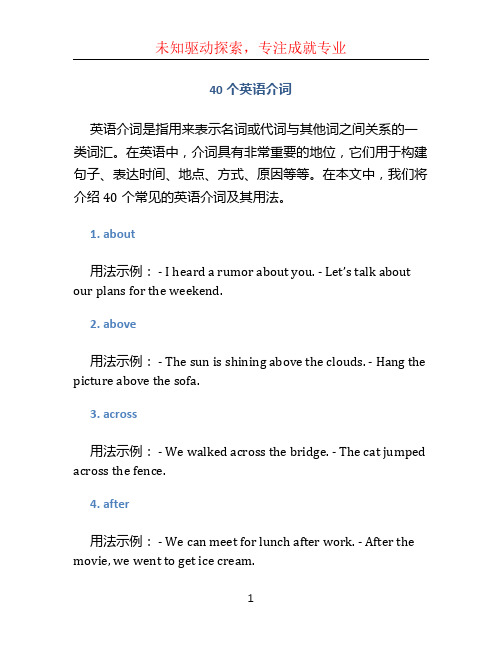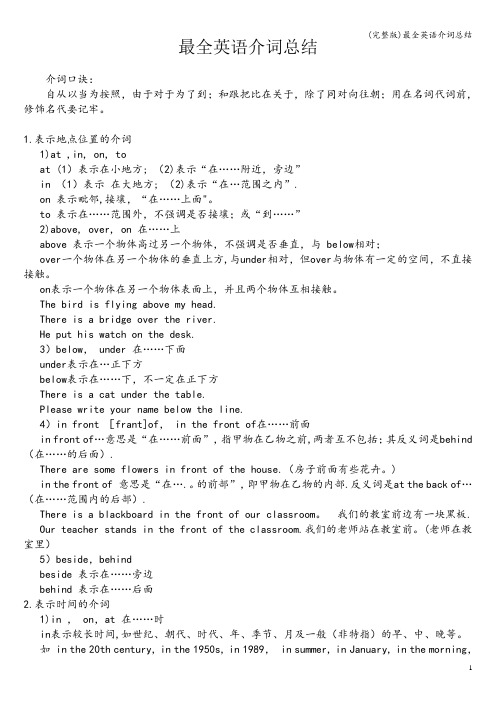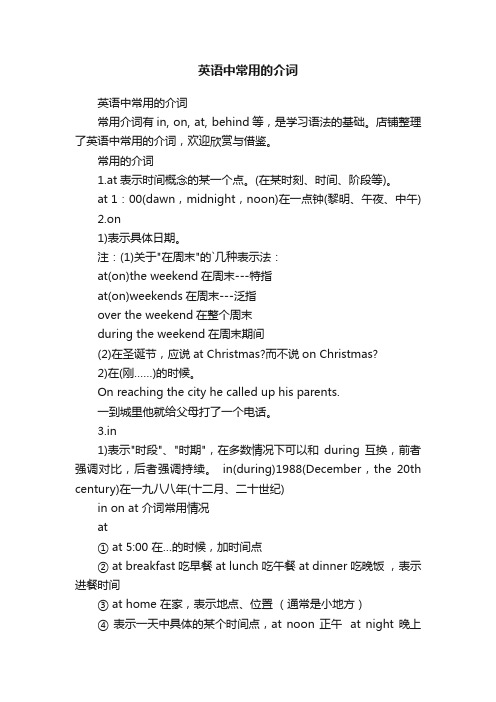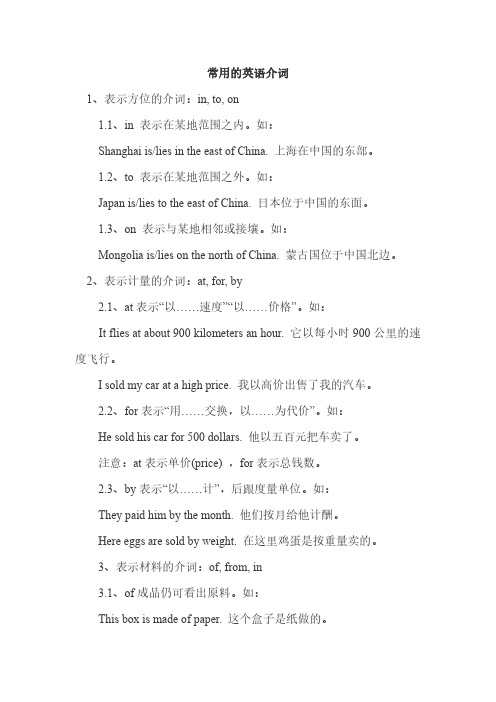英语介词
英语的基础介词

英语的基础介词
英语的基础介词包括:in, on, at, to, from, by, with, for, of, about 和 around 等。
1. In:表示在...里面,例如:in the box(在盒子里)。
2. On:表示在...上面,例如:on the table(在桌子上)。
3. At:表示在...地方,例如:at the school(在学校)。
4. To:表示到...地方,例如:to the store(到商店)。
5. From:表示从...地方来,例如:from China(从中国来)。
6. By:表示通过...方式,例如:by bus(通过公交车)。
7. With:表示和...一起,例如:with my friends(和我的朋友一起)。
8. For:表示为了...,例如:for you(为了你)。
9. Of:表示关于...,例如:a book of history(一本历史书)。
10. About:表示关于...,例如:what about you(你怎么样)?
11. Around:表示在...周围,例如:around the world(在世界各地)。
这些介词在英语中非常重要,它们可以用来表示时间、地点、方式、原因等。
掌握这些介词可以帮助你更好地理解和使用英语。
40个英语介词

40个英语介词英语介词是指用来表示名词或代词与其他词之间关系的一类词汇。
在英语中,介词具有非常重要的地位,它们用于构建句子、表达时间、地点、方式、原因等等。
在本文中,我们将介绍40个常见的英语介词及其用法。
1. about用法示例: - I heard a rumor about you. - Let’s talk about our plans for the weekend.2. above用法示例: - The sun is shining above the clouds. - Hang the picture above the sofa.3. across用法示例: - We walked across the bridge. - The cat jumped across the fence.4. after用法示例: - We can meet for lunch after work. - After the movie, we went to get ice cream.5. against用法示例: - He leaned against the wall. - The cat rubbed against my leg.6. along用法示例: - We walked along the beach. - Drive along the highway until you see the sign.7. among用法示例: - There is a sense of camaraderie among the team members. - The book is hidden among the other books on the shelf.8. around用法示例: - The children ran around the playground. - We walked around the park.9. as用法示例: - She worked as a teacher for many years. - You can use this hammer as a tool.10. at用法示例: - I met him at the café. - The meeting is scheduled at noon.11. before用法示例: - Let’s finish this task before the deadline. - He left the house before sunrise.12. behind用法示例: - The car is parked behind the building. - He hid behind the tree.13. below用法示例: - The temperature is below freezing. - The answer is written below the question.14. beneath用法示例: - The treasure is buried beneath the sand. - He found a note hidden beneath the pillow.15. beside用法示例: - She sat beside her friend. - Put the book beside the vase.16. between用法示例: - I couldn’t decide between the re d or blue dress. - The lake is located between the mountains.17. beyond用法示例: - His achievements go beyond his qualifications. - The house is just beyond the hills.18. by用法示例: - The package was delivered by the mailman. - I traveled to London by plane.19. despite用法示例: - He continued working despite the fatigue. - Despite the rain, we went for a walk.20. down用法示例: - We walked down the stairs. - The book fell down from the shelf.21. during用法示例: - We went on vacation during the summer. - I read a book during the flight.22. except用法示例: - Everyone was present except for John. - We ate all the cake except for one slice.23. for用法示例: - This gift is for you. - He studied for hours.24. from用法示例: - He received a letter from his friend. - She ran away from the crowd.25. in用法示例: - The book is in the bag. - She lives in Paris.26. inside用法示例: - He is waiting inside the building. - The keys are inside my pocket.27. into用法示例: - He jumped into the pool. - Pour the milk into a glass.28. like用法示例: - I feel like going for a walk. - He looks like his father.29. near用法示例: - There is a coffee shop near the office. - The playground is near the school.30. of用法示例: - She is the mother of two children. - The top of the mountain was covered in snow.31. off用法示例: - He took the hat off his head. - The plane took off from the runway.32. on用法示例: - The book is on the table. - I put on my coat.33. out用法示例: - He stepped out of the house. - She blew out the candles.用法示例: - The cat is sitting outside the window. - He is waiting outside the door.35. over用法示例: - We talked over dinner. - The ball jumped over the fence.36. past用法示例: - She walked past the store. - We drove past the old church.37. round用法示例: - We sat around the table. - The bus goes round the city.38. through用法示例: - He read through the book. - They walked through the forest.39. to用法示例: - He gave the present to his sister. - We went to the park.用法示例: - The cat is sleeping under the table. - The book is under the bed.以上是40个常用的英语介词及其用法。
(完整版)最全英语介词总结

(完整版)最全英语介词总结最全英语介词总结介词口诀:自从以当为按照,由于对于为了到;和跟把比在关于,除了同对向往朝;用在名词代词前,修饰名代要记牢。
1.表示地点位置的介词1)at ,in, on, toat (1)表示在小地方; (2)表示“在……附近,旁边”in (1)表示在大地方; (2)表示“在…范围之内”.on 表示毗邻,接壤,“在……上面"。
to 表示在……范围外,不强调是否接壤;或“到……”2)above, over, on 在……上above 表示一个物体高过另一个物体,不强调是否垂直,与 below相对;over一个物体在另一个物体的垂直上方,与under相对,但over与物体有一定的空间,不直接接触。
on表示一个物体在另一个物体表面上,并且两个物体互相接触。
The bird is flying above my head.There is a bridge over the river.He put his watch on the desk.3)below, under 在……下面under表示在…正下方below表示在……下,不一定在正下方There is a cat under the table.Please write your name below the line.4)in front [frant]of, in the front of在……前面in front of…意思是“在……前面”,指甲物在乙物之前,两者互不包括;其反义词是behind (在……的后面).There are some flowers in front of the house.(房子前面有些花卉。
)in the front of 意思是“在….。
的前部”,即甲物在乙物的内部.反义词是at the back of…(在……范围内的后部).There is a blackboard in the front of our classroom。
英语中常用的介词

英语中常用的介词英语中常用的介词常用介词有in, on, at, behind等,是学习语法的基础。
店铺整理了英语中常用的介词,欢迎欣赏与借鉴。
常用的介词1.at表示时间概念的某一个点。
(在某时刻、时间、阶段等)。
at 1:00(dawn,midnight,noon)在一点钟(黎明、午夜、中午)2.on1)表示具体日期。
注:(1)关于"在周末"的`几种表示法:at(on)the weekend在周末---特指at(on)weekends在周末---泛指over the weekend在整个周末during the weekend在周末期间(2)在圣诞节,应说at Christmas?而不说on Christmas?2)在(刚……)的时候。
On reaching the city he called up his parents.一到城里他就给父母打了一个电话。
3.in1)表示"时段"、"时期",在多数情况下可以和during互换,前者强调对比,后者强调持续。
in(during)1988(December,the 20th century)在一九八八年(十二月、二十世纪)in on at 介词常用情况at① at 5:00 在…的时候,加时间点② at breakfast 吃早餐 at lunch 吃午餐 at dinner 吃晚饭,表示进餐时间③ at home 在家,表示地点、位置(通常是小地方)④ 表示一天中具体的某个时间点,at noon 正午 at night 晚上at sunrise 日出⑤ 动词+at,指向某一目标或者到达某地。
arrive at 到达 knock at 敲⑥ at 15 years old 表示某个阶段,加年龄in① in the box 在盒子里面② in shanghai 在上海,表示地点、位置(通常是大地方)③ in her twenties and thirties 在她二三十岁的时候,表示一段时期④ in ten days 十天之后,加时间段表示在…之后⑤ in English 用英语,加语言表示使用什么语言on① on the table 在桌子上② on Sunday 在星期天,具体到某一天或者某一天的早上下午晚上,on Sunday night【英语中常用的介词】。
英语中所有的介词

beneath
〔bi5ni:W〕
prep.在…之下,在…底下 ad.在下方,在底下
with
〔wiT〕
prep.和…在一起,跟,同;用,以,藉;具有,带有;对…,关于;因,由于;随着;虽然,尽管
until
〔En5til, Qn5-〕
prep. / conj.直到(…为止);[用于否定句] 在…以前,直到…
〔E5lCN〕
prep.沿着 ad.向前
belong
prep.(在分类上)属,划归入;(to)(在所有权,关系等方面)属于
among
〔E5mQN〕
prep.在…之中,在…中间
through
〔Wru:〕
prep.穿过,通过;自始至终;以,用,凭借,经由;因为,由于 ad.从头到尾,自始至终;直达地;彻底地,完全地 a.直达的,直通的
on
〔Cn〕
prep.在…上;靠近,在…旁;关于,论及;在…的时候,在…后立即;向,朝,针对;凭…,靠…,根据,以…为基础;处于…情况中,在从事…中;是…的成员 ad.(放、穿、连接)上;向前;(继续)下去
upon
〔E5pCn〕
prep.=on
down
〔daun〕
over
〔5EuvE〕
prep.在…上方,在…的上面;在…方面,关于;高于,超过,在…之上;遍布在…的上面;在…期间 ad.在(这,那)一边;倒下,翻转过来;遍及地,全部地;再一次,重复地;过分地,太;从头至尾,自始至终 a.结束的,完了的
for
〔fC:; fE〕
prep.为,为了;[表示对象、用途等]给,对,供,适合于;代替,代表;因为,由于;就…而言;[表示时间、距离、数量]达,计;[表示目标、去向]往,向;赞成,支持 conj.因为,由于…的缘故
常用的英语介词

常用的英语介词1、表示方位的介词:in,to,on1.1、in表示在某地范围之内。
如:Shanghai is/lies in the east of China.上海在中国的东部。
1.2、to表示在某地范围之外。
如:Japan is/lies to the east of China.日本位于中国的东面。
1.3、on表示与某地相邻或接壤。
如:Mongolia is/lies on the north of China.蒙古国位于中国北边。
2、表示计量的介词:at,for,by2.1、at表示“以……速度”“以……价格”。
如:It flies at about900kilometers an hour.它以每小时900公里的速度飞行。
I sold my car at a high price.我以高价出售了我的汽车。
2.2、for表示“用……交换,以……为代价”。
如:He sold his car for500dollars.他以五百元把车卖了。
注意:at表示单价(price),for表示总钱数。
2.3、by表示“以……计”,后跟度量单位。
如:They paid him by the month.他们按月给他计酬。
Here eggs are sold by weight.在这里鸡蛋是按重量卖的。
3、表示材料的介词:of,from,in3.1、of成品仍可看出原料。
如:This box is made of paper.这个盒子是纸做的。
3.2、from成品已看不出原料。
如:Wine is made from grapes.葡萄酒是葡萄酿成的。
3.3、in表示用某种材料或语言。
如:Please fill in the form in pencil first.请先用铅笔填写这个表格。
They talk in English.他们用英语交谈。
注意:in指用材料,不用冠词;而with指用工具,要用冠词。
英语介词大汇总57个

57个介词aboard[əˈbɔːd] prep. 上(船,飞机,火车,汽车等)about[əˈbaʊt] ad. 大约;到处;四处prep. 关于;在各处;四处above [əˈbʌv] prep. 在……上面a. 上面的ad. 在……之上across[əˈkrɔs] prep. 横过,穿过after[ˈɑːftə(r)]r ad. 在后;后来prep. 在…之后;在后面conj. 在…以后against[əˈɡeinst] prep. 对着,反对along[əˈlɔŋ; (uS) əˈlɔŋ] ad. 向前;和…一起;一同prep. 沿着;顺着among[əˈmʌŋ] prep. 在…中间;在(三个以上)之间around[əˈraʊnd] ad. 在周围;在附近prep. 在……周围;大约as[əz, æz] ad.& conj.像……一样;如同;因为prep. 作为,当做at[æt] prep.在(几点钟);在(某处)before[biˈfɔː(r)] prep. 在…以前;在…前面ad. 以前conj. 在…之前behind [biˈhaind]prep. (表示位置)在…后面ad. 在后面;向后below[biˈləʊ] prep. 在……下面beneath[biˈniːθ] prep. 在…下方(面)beside[biˈsaid] prep. 在…旁边;靠近besides[biˈsaidz] prep. 除…以外(还有)ad. 还有,此外between[biˈtwiːn] prep. 在(两者)之间;在…中间beyond[biˈjɔnd] prep. (表示位置) 在…的那边but [bət, bʌt] conj. 但是,可是prep. 除了, 除……外by [bai] prep. 靠近,在…旁;在…时间;不迟于;被;用;由;乘(车)down[daʊn] prep. 沿着,沿…而下ad. 向下during [ˈdjʊəriŋ; (uS) ˈdʊəriŋ]prep. 在…期间;在…过程中except [ikˈsept]prep. 除……之外for [fə(r), fɔː(r)] prep. 为了…;向…,往…;与…交换;防备…;适合…;因为…;在…期间;对于…;对…来说conj. 因为,由于from[frəm, frɔm] prep.从;从…起.距.来自in [in] prep. 在…里(内);在…;以…ad. 在家,在内,向内inside [inˈsaid] prep.在…里面ad.在里面into [ˈintʊ, ˈintə] prep. 到…里;向内;变成like [laik] prep. 像,跟…一样vt. 喜欢,喜爱minus [ˈmainəs] prep. & a.负的,减去的near[niə(r)] a. 近的ad. 附近,邻近prep. 在……附近,靠近of [ɔv, əv; (uS) ɔːf]prep.(表所属,数量,) ….的off[ˈɔf; (uS) ɔːf] prep. 离开,脱离,(走)开on[ɔn] prep. 在…上(时),关于ad. (穿,放…)上;接通;进行下去;(电灯)开onto[ˈɔntʊ] prep. 到…的上面outside[aʊtˈsaid] n. 外面ad. 在外面;向外面prep. 在…外面over[ˈəʊvə(r)] prep. 在…上方,越过,遍及ad. 翻倒,遍布,越过,结束past [pɑːst; (uS) pæst] ad. 过n.过去,昔日,往事prep. 过…,走过某处per [pə(r)] prep. 每,每一plus [plʌs] prep.加,加上round [raʊnd] ad. 转过来prep. 环绕一周,围着a.圆的;球形的since [sins]ad. 从那时以来conj. 从…以来,…以后,由于prep. 从…以来through [θruː] prep.穿(通)过;从始至终ad.穿(通)过;自始至终,全部throughout [θruːˈaʊt] prep. 遍及,贯穿till [til] conj.& prep.直到,直到…为止to [tʊ, tuː] prep. (动词不定式符号,无词义);(表示接受动作的人或物)给;对,向,到;在…之前toward(s) [təˈwɔːd] prep. 向,朝,对于under [ˈʌndə(r)] ad.& prep.在…下面,向…下面unlike [ʌnˈlaik] prep. 不像,和…不同until [ʌnˈtil] prep.& conj.直到…为止up [ʌp] ad. 向上;在上方;起来;在…以上a. 上面的,向上的,上行的n. 上升;上坡;上行;繁荣v. 举起;拿起;提高prep. 向(高处);向(在)……上(面)游upon [əˈpɔn] prep. 在……上面via [ˈvaiə] prep. 经过(某地),通过with [wiʃ] prep.关于,带有,以,和,用,有within [wiˈðin] prep. 在……里面without [wiˈðaʊt] prep. 没有。
介词英语单词大全

介词(preposition 简写prep.)又称作前置词,表示名词、代词等与句中其他词的关系,在句中不能单独作句子成分。
介词后面一般有名词、代词或相当于名词的其他词类、短语或从句作它的宾语,表示与其他成分的关系。
介词和它的宾语构成介词词组,在句中作状语,表语,补语,定语或介词宾语。
介词可以分为时间介词、地点介词、方式介词、原因介词、数量介词和其他介词。
介词一般用于名词或者代词前面,表示该词与句中其他成分的关系。
介词后面的名词或代词称为介词宾语(如果是人称代词,则要用宾格)。
介词和介词宾语合在一起构成介词短语。
按构词成分介词又称作前置词,表示它后面的名词或代词(或相当于名词的其他词类、短语或从句)与其他句子成分的关系。
介词通常位于名词或代词之前。
(注意:介词是一种虚词,不能单独作句子成分,只能用在一个名词、代词或相当于名词的结构之前,可以与后面的词一起构成介词短语。
)简单介词包括in,on,with,by,for,at,about,under,of等。
Where is the cat?合成介词包括into,within,throughout,inside,outside,without等重叠介词from among 从...当中from behind 从...后面,until after 直至...之后,at about 在大约...,after about 在大约...之后等短语介词一个或两个简单介词和一个或几个其他词类构成一个短语,作用相当于一个介词,这就叫做短语介词。
这类介词的末尾总是一个简单介词如according to,because of,by means of,in addition to,in front of,in spite of,into等。
分词介词有极少数介词的词尾是“-ing”,形似现在分词(其中也有些可做分词)。
常用的有:considering,regarding,respecting,including。
- 1、下载文档前请自行甄别文档内容的完整性,平台不提供额外的编辑、内容补充、找答案等附加服务。
- 2、"仅部分预览"的文档,不可在线预览部分如存在完整性等问题,可反馈申请退款(可完整预览的文档不适用该条件!)。
- 3、如文档侵犯您的权益,请联系客服反馈,我们会尽快为您处理(人工客服工作时间:9:00-18:30)。
介词:
介词英文缩写是prep.是英文preposition的缩写。
介词是一种用来表示词与词、词与句之间的关系的虚词,在句中不能单独作句子成分。
介词后面一般有名词代词或相当于名词的其他词类,短语或从句作它的宾语。
介词和它的宾语构成介词词组,在句中作状语,表语,补语或介词宾语。
介词可以分为时间介词、地点介词、方式介词、原因介词和其他介词。
1.表示地点位置的介词
1)at ,in, on, to,for
at (1)表示在小地方; (2)表示“在……附近,旁边”
in (1)表示在大地方; (2)表示“在…范围之内”。
on 表示毗邻,接壤,“在……上面”。
to 表示在……范围外,不强调是否接壤;或“到……”
2)above, over, on 在……上
above 指在……上方,不强调是否垂直,与below相对;
over指垂直的上方,与under相对,但over与物体有一定的空间,不直接接触。
on表示某物体上面并与之接触。
The bird is flying above my head. There is a bridge over the river. He put his watch on the desk.
3)below, under 在……下面
under表示在…正下方
below表示在……下,不一定在正下方
There is a cat under the table. Please write your name below the line.
4)in front [frant]of, in the front of在……前面
in front of…意思是“在……前面”,指甲物在乙物之前,两者互不包括;其反义词是behind (在……的后面)。
There are some flowers in front of the house.(房子前面有些花卉。
) in the front of 意思是“在…..的前部”,即甲物在乙物的内部.反义词是at the back of…(在……范围内的后部)。
There is a blackboard in the front of our classroom. 我们的教室前边有一块黑板。
Our teacher stands in the front of the classroom. 我们的老师站在教室前.(老师在教室里)
5)beside,behind beside 表示在……旁边behind 表示在……后面
2.表示时间的介词
1)in , on,at 在……时
in表示较长时间,如世纪、朝代、时代、年、季节、月及一般(非特指)的早、中、晚等。
如in the 20th century, in the 1950s, in 1989, in summer, in January, in the morning, in one’s life , in one’s thirties等。
on表示具体某一天及其早、中、晚。
如on May 1st, on Monday, on New Year’s Day, on a cold night in January, on a fine morning, on Sunday afternoon等。
at表示某一时刻或较短暂的时间,或泛指圣诞节,复活节等。
如at 3:20, at this time of year, at the beginning of, at the end of …, at the age of …, at Christmas,at night, at noon, at this moment等。
注意:在last, next, this, that, some, every 等词之前一律不用介词。
如:We meet
every day.
2)in, after 在……之后
“in +段时间”表示将来的一段时间以后;
“after+段时间”表示过去的一段时间以后;“after+将来的时间点”表示将来的某一时刻以后。
3)from, since 自从……
from仅说明什么时候开始,不说明某动作或情况持续多久;
since表示某动作或情况持续至说话时刻,通常与完成时连用。
since表示"自(某具体时间)以来",常用作完成时态谓语的时间状语。
since liberation(1980)自从解放(1980年)以来They have been close friends since childhood.他们从小就是好朋友。
(1)since the war是指"自从战争结束以来",若指"自从战争开始以来",须说"since the beginning of the war"。
(2)不要将since与after混淆。
比较:He has worked here since 1965.(指一段时间,强调时间段)自从1965年以来,他一直在这儿工作。
He began to work here after 1965.(指一点时间,强调时间点)从1965年以后,他开始在这儿工作。
4)after, behind 在……之后
after主要用于表示时间;behind主要用于表示位置。
时间名词前介词用法口诀年前周前要用in 具体日子要用on 遇到几号也用on 上午下午得是in 要说某日上下午用on换in记清楚午夜黄昏用at 黎明用它也不错at用在时分前说“差”可要用上to 说"过''要用past
编辑本段3.表示运动方向的介词:
across, through 通过,穿过across表示横过,即从物体表面通过,与on有关,为二维through穿过,即从物体内部穿过,与in有关,为三维。
表示“在……之间”的介词:
表示“在……之间”的介词在英语中属于方位介词,如in front of ,behind ,on,in,near,under,up between, among between指在两个人或两个事物之间;among指在三个或三个以上的人或事物之间。
其他意义的介词
1)on ,about 关于
on 表示这本书,这篇文章或演说是严肃的,或学术性的,可供专门研究这一问题的人阅读;about表示内容较为普通,不那么正式。
2)by, with, in 表示方法、手段、工具
by 以……方法、手段或泛指某种交通工具;with 表示用…工具、手段,一般接具体的工具和手段;in 表示用…方式,用…语言(语调、笔墨、颜色)等;
3)except, besides 除了
except 除……之外,不包括在内;besides 除……之外,包括在内。
Except for Mr. Wang, we went to see the film.(王先生没去) Besides Mr. Wang, we also went to see the film.(王先生也去了)
动词与介词(或副词)的搭配
add…to 加到……上
agree with 同意(某人)
arrive at(in) 到达
ask for 询问
begin…with 从……开始
believe in 相信
break into 闯入break off 打断break out 爆发bring down 降低
bring in 引进bring up 教育,培养
build up 建起
burn down 烧光
call back 回电话call for 要求约请call in 召来call on 拜访访问
care for 喜欢
carry on 继续开展carry out 实行开展
check out 查明结帐
clear up 整理,收拾
come about 发生,产生come across (偶然)遇见come out 出来come to 共计达到
compare…with 与……比较compare to 比作cut off 切断
date from 始于
depend on 依靠
devote to 献于die out 灭亡
divide up 分配dream of 梦想
fall off 下降fall over 跌倒
feed on 以……为食
get down to 专心于get through 通过give in 让步,屈服。
